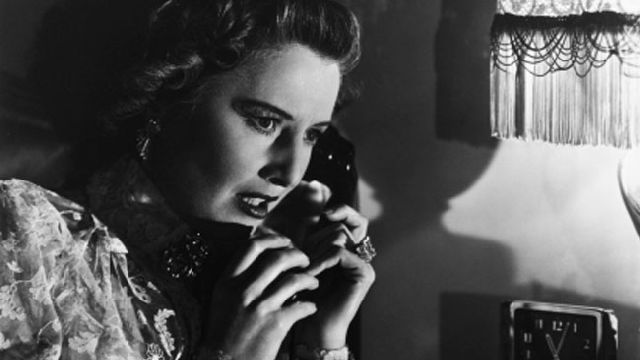Sorry, Wrong Number (1948) 
“The prize-winning radio suspense drama that thrilled 40,000,000 people … now electrifies the screen!”

Director: Anatole Litvak
Cast: Barbara Stanwyck, Burt Lancaster, Ann Richards
Synopsis: Whilst on the telephone, an invalid woman overhears what she thinks is a plot for murder and attempts to prevent it.
Leona Stevenson (Barbara Stanwyck) is a wealthy but spoiled heiress to a powerful industrialist (Ed Begley). She’s used to getting what she wants, as evidenced by the way she snatched her now-husband Henry (Burt Lancaster) away from his girlfriend Sally (Ann Richards). The marriage vow, ’I, Leona, take thee, Henry,’ is repeated during a flashback montage of the newly-married couple’s honeymoon so that it becomes a statement of ownership rather than an avowal of love, and when Henry shows tentative signs of trying to assert himself Leona feigns a heart ailment which she actually believes to be authentic.
Bed-ridden by her imagined illness, the telephone is Leona’s lifeline to the outside world, but it becomes an instrument of torture when she gets a crossed line and overhears a couple of strangers confirming plans for an act of murder of which, she slowly realises, she is to be the victim. There follows a frantic evening of revelations as Leona pieces together both the reasons why someone wants her dead and their identity.
Based on a hit radio play in which Agnes Moorehead played the role of Leona, Anatole Litvak’s screen version provides an absorbing, Noir-tinged drama that is weakened by a couple of unlikely coincidences and a lead character who we quickly learn is something of a spoiled manipulative bitch. No doubt, were she to live to a grand old age, she would have turned into Florence Bates. Litvak develops a convincing sense of entrapment as the story switches between numerous flashbacks and Leona’s increasing desperation as she realises how vulnerable she really is. Stanwyck, one of Hollywood’s most accomplished actresses, manages the role with ease, while Lancaster is surprisingly convincing playing a weak man who allows himself to be swept back and forth by events like a cork in a turbulent sea.
The film’s final intense and disturbing scene is probably what earned the film a reputation which is perhaps a little greater than it deserves. It must have been something of a shock to 1940s audiences to witness a finale like that, and still packs quite a punch today. Unfortunately, the shrewish nature of Leona’s nature makes it difficult for the audience to root for her and, to be honest, the more we learn about her, the more difficult it becomes to prevent oneself from siding with the killer.
(Reviewed 24th July 2012)
httpv://www.youtube.com/watch?v=SDLfDfr4GIU
